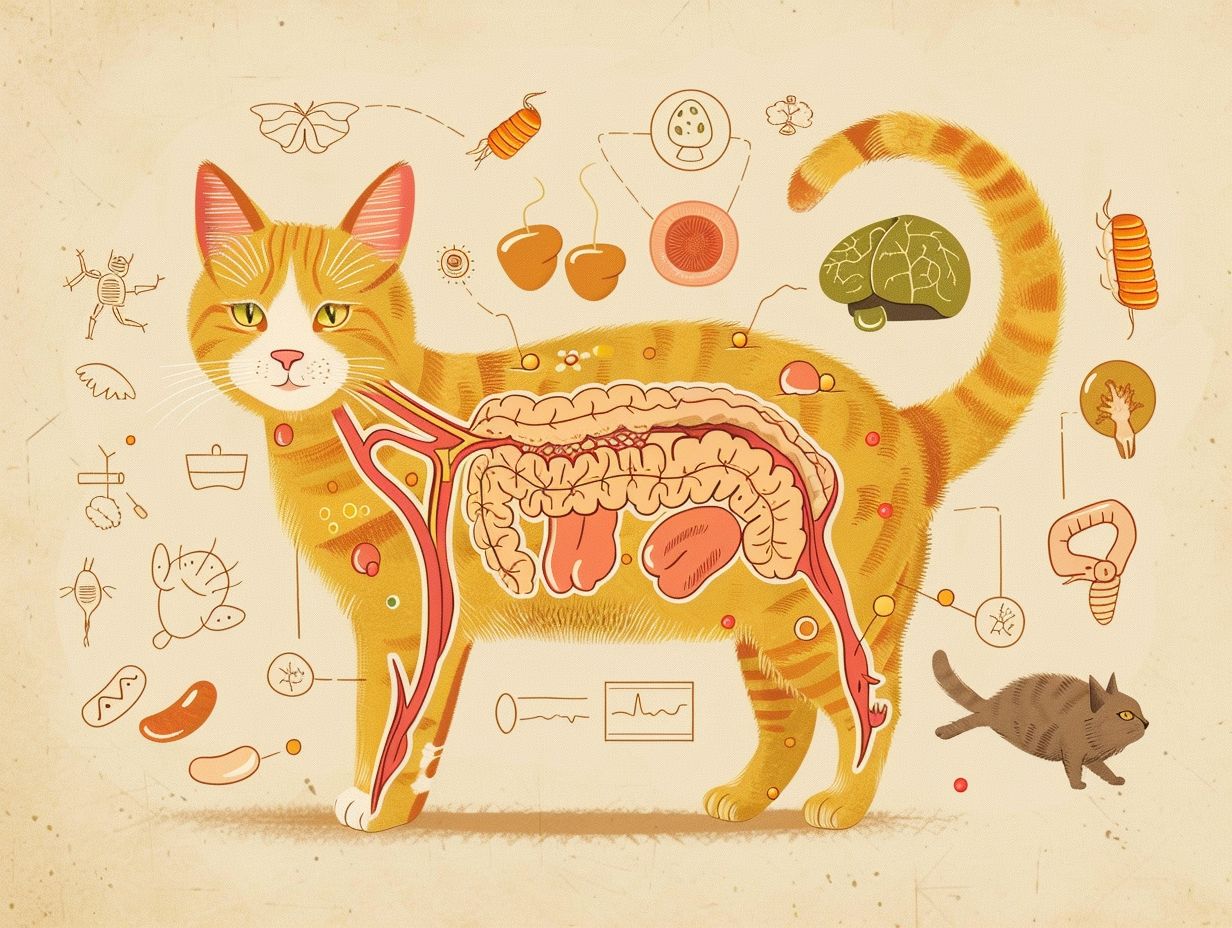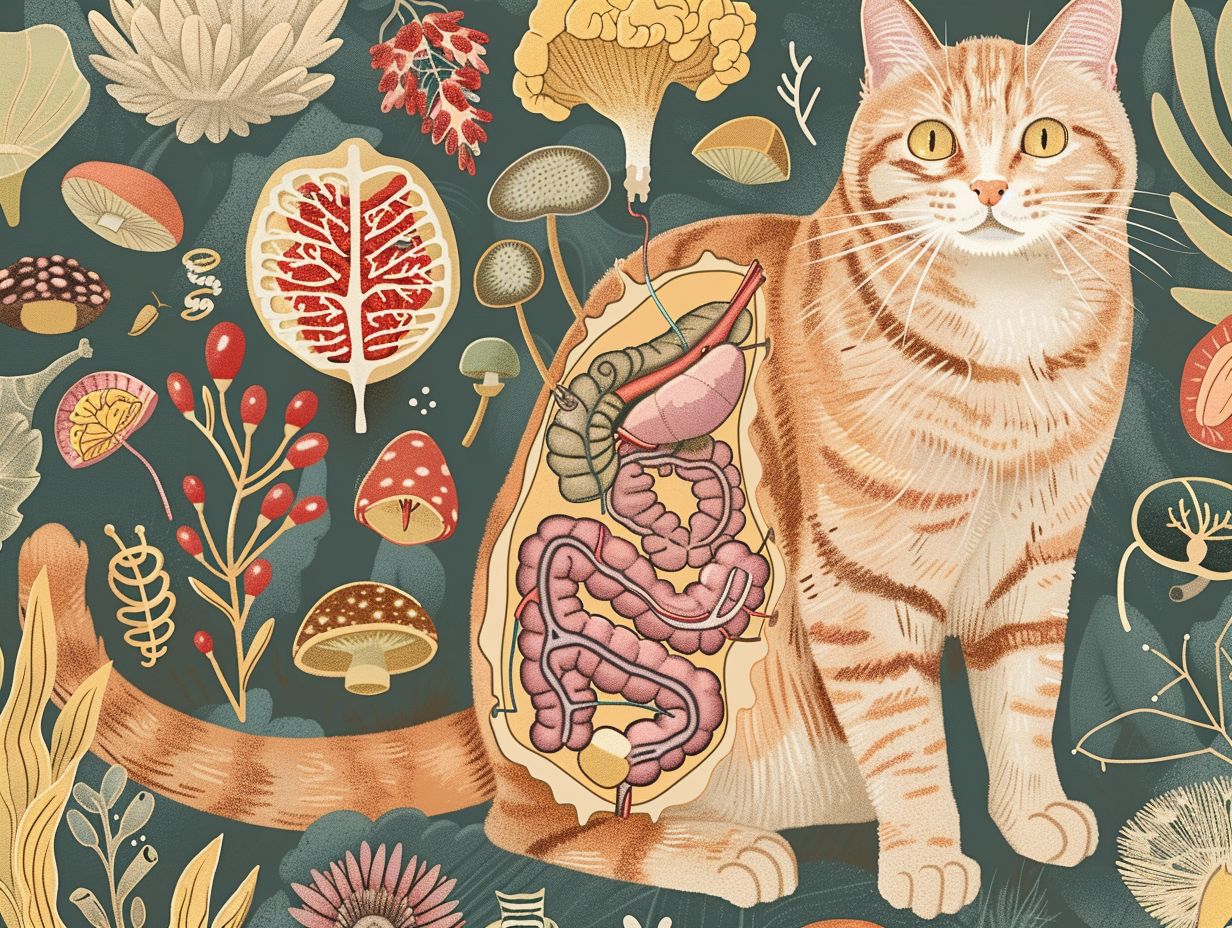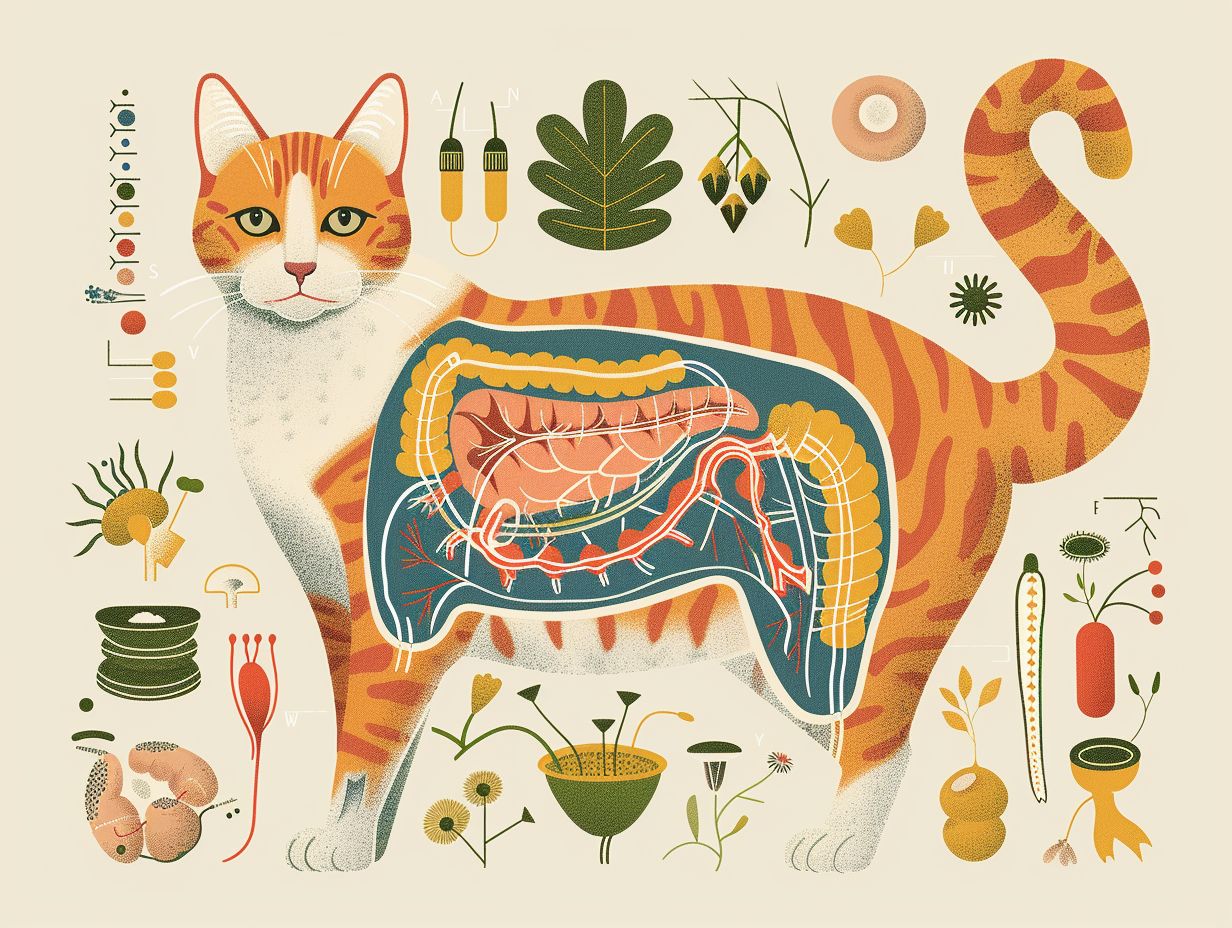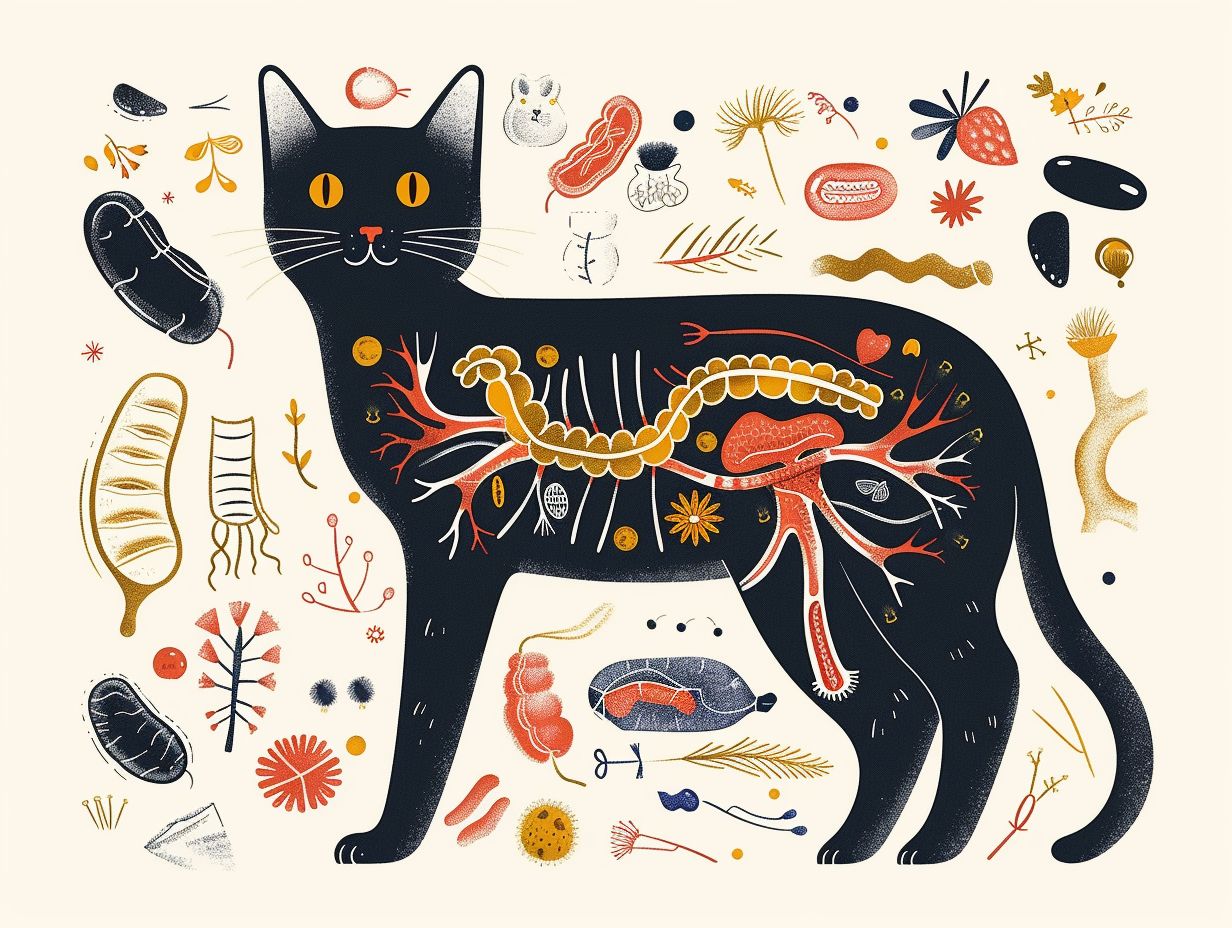Nutritional Management Of Gastrointestinal Problems In Cats
This article covers the common problems and causes of gastrointestinal issues in cats, along with the symptoms, diagnosis, and treatment options for such problems. It also provides tips for preventing these issues and recognizing when it is necessary to seek veterinary care.
Key Takeaways:

Gastrointestinal Issues in Cats
Gastrointestinal issues in cats encompass a range of conditions that impact the digestive system, often manifesting as chronic and progressive ailments that can compromise the overall health and wellness of affected felines. Common gastrointestinal diseases in cats include inflammatory bowel disease (IBD), pancreatitis, and parasites, resulting in chronic vomiting, diarrhea, and weight loss.
Nutritional intervention plays a vital role in managing gastrointestinal diseases, with therapeutic diets available to support the digestive system and reduce inflammation. Clinical studies have identified key nutritional factors that aid in supporting the gastrointestinal tract in feline patients, such as highly digestible, moderate to high protein content diets, soluble fiber supplementation, and the inclusion of prebiotics and probiotics. Regular veterinary monitoring and adjustments to the diet are essential components for successfully managing gastrointestinal issues in cats.
Common Problems and Causes
The most common gastrointestinal problems in cats are inflammatory bowel disease, lymphoma, and endocrine diseases. The causes of these ailments can be multifactorial, including dietary imbalances, infections, and genetic predispositions.
Inflammatory bowel disease (IBD) in cats is one of the most frequent disorders and is characterized by chronic inflammation of the gastrointestinal tract. Dietary factors play a significant role in the etiology and pathogenesis of IBD, as some cats may have food sensitivities to specific dietary proteins or components. Gastrointestinal problems in cats can also arise from infections caused by various bacteria or parasites.
Genetic factors contribute significantly to the development of these diseases, as certain cat breeds are predisposed to specific gastrointestinal conditions. Understanding these causes is crucial for the management and treatment of feline gastrointestinal diseases.
Signs and Symptoms of Gastrointestinal Problems
Common signs and symptoms of gastrointestinal problems in cats include vomiting, diarrhea, weight loss, and decreased appetite, which are often indicative of underlying digestive issues. Observing changes in the cat’s normal behaviors or habits, such as frequent hairballs, bloating, or excessive gas, can also signal potential digestive problems. Monitoring for alterations in litter box habits, such as irregular stool consistency or the presence of blood in the feces, is crucial. Cats exhibit selective eating habits, so a sudden aversion to food or increased reluctance to eat certain foods may suggest an underlying gastrointestinal problem. Additionally, monitoring water intake is essential as hydration plays a role in overall digestive function.
Identifying and Addressing Symptoms

Identifying and addressing gastrointestinal symptoms in cats often involves diagnostic tests such as blood work, fecal analysis, and imaging studies. Treatment approaches typically include dietary therapy, medication, and management of underlying conditions.
Blood work is often the initial step in diagnosing gastrointestinal issues in cats as it assesses organ function, including the liver and kidneys, and detects abnormalities. Fecal analysis is utilized to diagnose parasites, bacterial infections, and other digestive disorders that may be contributing to the symptoms. Imaging studies such as x-rays and ultrasounds are used to visualize internal organs and identify potential abnormalities.
In terms of treatment, dietary therapy plays a crucial role in managing gastrointestinal diseases and disorders like inflammatory bowel disease. Specialized diets can help reduce inflammation and enhance digestive function. Medications such as probiotics, anti-inflammatories, or antibiotics may be prescribed to alleviate symptoms. For cats with chronic conditions such as chronic kidney disease, a tailored dietary plan is essential for supporting kidney function, symptom control, and overall health maintenance. Pet owners should collaborate with their veterinarian to develop a comprehensive treatment plan tailored to their cat’s specific needs.
Nutritional Management for Cats with GI Problems
The treatment of gastrointestinal conditions in cats relies heavily on nutritional management. Dietary adjustments, supplementation, and sometimes parenteral nutritional support are implemented to enhance gastrointestinal health and overall well-being in felines.
Controlling food and nutrient intake is crucial in managing animals with gastrointestinal issues, with nutritional support playing a key role in caring for cats with such conditions. Critical care nutrition, which is highly digestible and absorbable, is essential to meet nutrient requirements in severely ill or recovering cats.
While most cats with gastrointestinal problems receive adequate nutrients through regular feeding, parenteral support involving intravenous fluids and/or feeding tubes may be necessary in cases of severe debilitation or anorexia to deliver vital nutrients directly into the bloodstream. This approach can be life-saving for critically ill cats and aid in their recovery process.
Dietary Changes and Supplements
Dietary changes and supplements, such as specialized diets and supplements for digestive diseases in specialized veterinary clinics, can aid cats with GI disorders like lymphoma.
Specialized diets can assist in managing conditions such as lymphoma by providing essential nutrients for cats while being gentle on their inflamed digestive systems. The specialized staff at veterinary clinics can recommend diets that are high in protein and easily digestible ingredients, which can support the overall health of cats suffering from GI disorders.
This specialized nutrition can help reduce inflammation, boost the immune system, and enhance the quality of life for feline patients with digestive disorders, including lymphoma.
Preventing Gastrointestinal Issues in Cats
Preventive measures can help reduce the incidence of gastrointestinal issues in cats. Regular health screenings, proper nutrition, and physical exercise can lower the occurrence of gastrointestinal diseases in cats by reducing the frequency of endocrine diseases that can negatively impact feline gastrointestinal health.
Cat owners should carefully monitor their pets’ diet, providing a high-quality, balanced diet rich in fiber, probiotics, and essential nutrients to support proper digestion. Adequate hydration is essential to ensure the proper functioning of the gastrointestinal tract in felines.
Encouraging moderate physical activity through play or exercise can aid in digestion and promote overall health in cats. Implementing these lifestyle changes can contribute to maintaining your cat’s digestive health and preventing gastrointestinal diseases.
Tips for Maintaining a Healthy Digestive System

To maintain a healthy digestive system in cats, it is important to provide them with a balanced diet, ensure adequate hydration, and schedule regular veterinary check-ups. Further insights on supporting feline gastrointestinal wellness can be found in related articles on enteral nutrition and digestive health.
Including high-quality protein sources such as lean meats or fish in their diet can help promote a healthy digestive system in cats. A combination of soluble and insoluble fiber from vegetables or specialized cat food can aid in promoting regular bowel movements. Providing clean, fresh water at all times is essential for proper hydration, which is crucial for a healthy digestive system in cats.
Regular consultations with your veterinarian regarding your cat’s nutritional and overall digestive health can help in identifying and addressing potential issues early on.
When to Seek Veterinary Care
Recognizing the signs indicating the need for veterinary care for gastrointestinal issues in cats is crucial for timely intervention and proper treatment. If cats exhibit persistent symptoms like vomiting, diarrhea, or lethargy, cat owners should contact a full-time associate at a local veterinary clinic in the United States.
It is essential to understand that gastrointestinal problems in cats can deteriorate quickly and lead to severe health issues if left untreated. Seeking veterinary care promptly allows for the diagnosis of underlying issues and the provision of appropriate medical attention. Cats may display signs of discomfort such as abdominal pain, loss of appetite, or changes in behavior when experiencing GI problems.
Consulting a dedicated professional at a local veterinary clinic ensures that cats receive the necessary veterinary care for a proper recovery.
Understanding When Professional Help is Needed
Understanding the limitations of home care and the complexities of certain gastrointestinal conditions can offer valuable guidance to cat owners on when to seek professional intervention for managing feline GI issues.
Abstracts on disease management strategies and disease often offer helpful advice on when to seek specialized care for specific gastrointestinal conditions in cats. Some pets, particularly cats, develop intricate gastrointestinal disorders that necessitate expert intervention beyond what can be administered at home.
When the symptoms of the condition persist despite dietary changes or alterations in daily routines, it is advisable to contemplate seeking advice and care from a veterinary specialist.
Abstracts on disease management strategies provide insights into potential solutions for these issues and offer direction on when to seek expert assistance for managing feline GI conditions. By utilizing these resources, cat owners can make well-informed decisions and provide optimal care for their cats experiencing gastrointestinal problems.
Frequently Asked Questions
What are gastrointestinal problems in cats?

Gastrointestinal problems in cats can range from mild issues like occasional vomiting and diarrhea to more serious conditions such as inflammatory bowel disease or pancreatitis. These problems can cause discomfort and affect the overall health and well-being of your cat.
How can nutrition help manage gastrointestinal problems in cats?
Nutrition plays a crucial role in managing gastrointestinal problems in cats. A balanced and easily digestible diet can help reduce symptoms and promote healing in the digestive system. Certain nutrients and ingredients can also be beneficial in managing specific gastrointestinal issues.
What type of diet is recommended for cats with digestive issues?
A diet that is highly digestible and low in fat is typically recommended for cats with gastrointestinal problems. This can include prescription diets from your veterinarian or commercial diets specifically formulated for cats with sensitive stomachs.
Are there any specific ingredients to look for in cat food for digestive health?
For cats with gastrointestinal problems, it is important to look for ingredients that are easily digestible and unlikely to cause irritation or inflammation in the digestive tract. Some common ingredients to look for include high-quality proteins, prebiotic fibers, and omega-3 fatty acids.
Can I make any dietary changes at home to help manage my cat’s digestive issues?
It is always best to consult with your veterinarian before making any dietary changes for your cat. They can recommend the most appropriate type of diet and provide guidance on transitioning your cat to a new diet. Abrupt changes in food can actually worsen gastrointestinal problems in cats.
What other factors should I consider when managing my cat’s gastrointestinal problems?
In addition to nutrition, other factors that can play a role in managing gastrointestinal problems in cats include stress levels, hydration, and feeding schedule. It is important to work closely with your veterinarian to address all aspects of your cat’s care for the best possible outcome.
